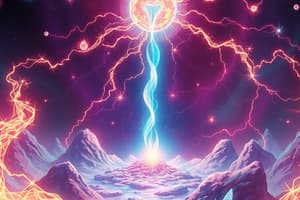Podcast
Questions and Answers
What is the type of energy generated from the movement of electrons through a conductor?
What is the type of energy generated from the movement of electrons through a conductor?
- Electrical energy (correct)
- Nuclear energy
- Chemical energy
- Radiant energy
Why does Rico feel a 'zap' when taking his socks from the dryer?
Why does Rico feel a 'zap' when taking his socks from the dryer?
- Due to nuclear reaction
- Due to chemical reaction
- Due to radiant energy
- Due to static electricity (correct)
Which sector consumes the most energy?
Which sector consumes the most energy?
- Agriculture
- Transportation
- Industrial (correct)
- Residential
What is not an example of conserving resources?
What is not an example of conserving resources?
Which of the following is not a fossil fuel?
Which of the following is not a fossil fuel?
What type of energy is released through a chemical reaction?
What type of energy is released through a chemical reaction?
What is the energy that comes from splitting an atom?
What is the energy that comes from splitting an atom?
Digesting food is an example of which form of energy?
Digesting food is an example of which form of energy?
What is the term for energy at work?
What is the term for energy at work?
What happens when an object is charged with electrons?
What happens when an object is charged with electrons?
What is the term for the energy of an object that is not moving?
What is the term for the energy of an object that is not moving?
Flashcards are hidden until you start studying
Study Notes
Energy Basics
- Energy is the ability to do work.
- Energy can take many forms, including electrical, heat, radiant, fossil fuel, mechanical, chemical, nuclear, kinetic, and potential energy.
Types of Energy
- Electrical Energy: the movement of electrons through a conductor.
- Heat Energy: the movement of energy from one object to another.
- Radiant Energy: energy created through electromagnetic waves (e.g., solar energy).
- Fossil Fuel Energy: non-renewable resources such as coal, oil, and gas.
- Mechanical Energy: also known as motion energy, when a force acts on an object to make it move.
- Chemical Energy: energy released through a chemical reaction.
- Nuclear Energy: energy stored in the nucleus of an atom.
- Kinetic Energy: energy at work, measured in Joules.
- Potential Energy: energy "stored" in an object.
Conservation and Resources
- Non-Renewable Resource: something that can only be used once (e.g., coal, oil, gas).
- Renewable Resource: something that can be used more than once because it is replaced naturally (e.g., sun, wind).
- Conservation of Energy: saving energy by not using more than what is needed.
- Dissipation: wasting energy through unnecessary uses.
Energy Examples and Applications
- Light bulbs produce thermal energy and radiant energy.
- LED lights are more energy efficient than older light bulbs because they generate less heat.
- Static electricity occurs when an object is charged with electrons, like when clothes stick together after being in the dryer.
- Digesting food is an example of chemical energy.
Studying That Suits You
Use AI to generate personalized quizzes and flashcards to suit your learning preferences.




